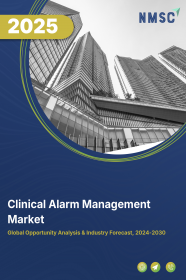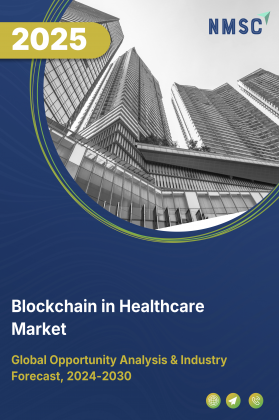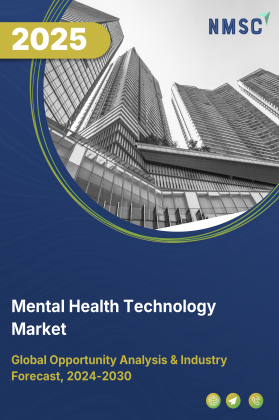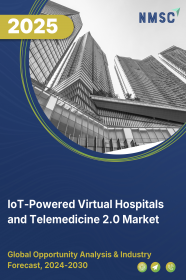
Clinical Alarm Management Market by Component (Services and Solutions), by Product (Telemetry Monitors, Infusion Pumps, Nurse Call Systems, Compression Pumps, Physiological Monitors, Ventilators, Anaesthesia Machines, Bed Alarms, and Other Products), and by End User (Hospital and Clinics, Ambulatory and Home Care Centres, Long Term and Palliative Care Centres, and Other End Users) – Global Opportunity Analysis and Industry Forecast, 2024–2030
Market Definition
The Clinical Alarm Management Market size was valued at USD 2.42 billion in 2023 and is predicted to reach USD 6.68 billion by 2030 with a CAGR of 15.6% from 2024-2030. Clinical Alarm Management is a systematic approach employed in healthcare settings to handle alarms generated by medical devices, ensuring patient safety and efficient workflow. It involves continuous monitoring and timely notification of alarms, prioritization based on clinical significance, customization of settings to individual patient needs, and education for healthcare staff.
This approach not only contributes to improved patient outcomes but also streamlines healthcare workflows, providing a more focused and personalized care environment. Advantages of clinical alarm management include enhanced patient safety through timely responses to critical alarms, reduced alarm fatigue for healthcare professionals, and optimized workflow. In conclusion, clinical alarm management systems play a pivotal role in revolutionizing patient care by addressing the challenges associated with alarm fatigue and inefficient alarm handling in clinical settings.
Market Dynamics and Trends
The rising integration of clinical alarm management systems with healthcare information technology (IT) infrastructure is driving the growth of industry. These systems collect and integrate patient data from various sources including electronic health records (EHRs) and medical devices.
This enables clinical alarm management systems to analyze patient conditions and vital signs comprehensively. For instance, in November 2023, Sonder Health partnered with Aloe Care to offer voice-activated medical alert system solutions for older adults. This includes a voice-activated Smart Hub with 24/7 access to professional emergency response, motion sensors, temperature sensors, air-quality sensors, and a wearable care button.
Moreover, the global aging population contributes to a higher prevalence of chronic diseases and complex medical conditions, which increases the demand for clinical alarm management systems. This demographic shift underscores the importance of robust clinical alarm management to monitor and respond to the diverse needs of older patients.
According to a report published by World Health Organization (WHO), the global population of individuals aged 60 years and older is expected to reach 2.1 billion by the year 2050. Also, it is estimated that one-sixth of the worldwide population will be 60 years old or above by the year 2030. This increase in geriatric population further contributes to the growth of clinical alarm management systems globally.
However, the high initial investments and ongoing maintenance expenses associated with clinical alarm management are major challenge for clinicians in the market. On the contrary, the integration of AI technologies, including machine learning algorithms to enhance the accuracy of alarm systems is expected to create significant opportunity growth for the market.
These systems can learn from historical data to better predict and identify critical events, reducing false alarms and improving overall system efficiency. For instance, in August 2023, CalmWave launched an AI platform designed to address alarm fatigue in intensive care units (ICUs).
This platform uses objective data and AI to reduce non-actionable alarms by as much as 83% compared to manual alarm systems. This approach provides clinicians with a holistic view of the information to make informed decisions regarding alarm management and patient care.
Market Segmentations and Scope of Study
The clinical alarm management market is segmented on the basis of component, product, end user, and region. On the basis of component, the market is categorized into services and solutions. On the basis of product, the market is segmented into telemetry monitors, infusion pumps, nurse call systems, compression pumps, physiological monitors, ventilators, anaesthesia machines, bed alarms, and other products. On the basis of end-user, the market is classified into hospital and clinics, ambulatory and home care centres, long term and palliative care centres, and other end users. Regional breakdown and analysis of each of the aforesaid segments include regions comprising North America, Europe, Asia-Pacific, and the Rest of the World (RoW).
Geographical Analysis
North-America holds the dominating share in the clinical alarm management market and is expected to continue its dominance during the forecast period. This is attributed to factors such as the rising government initiatives and regulations for the clinical alarm systems among the healthcare facilities in countries including the U.S. and Canada.
These regulatory bodies establish guidelines, standards, and recommendations to ensure the safety and effectiveness of alarm systems used in healthcare settings. For example, the Food and Drug Administration (FDA) in the U.S. issued guidelines and recommendations for clinical alarm management. These guidelines aim to standardize alarm practices, mitigate alarm-related risks, and improve patient outcomes in healthcare settings.
Also, the presence of prominent key market players in the clinical alarm management market including Vocera, GE Healthcare, and Cornell Communication are adopting various market strategies such as partnerships and product launches to enhance the market growth in the region.
For instance, in February 2022, Vocera partnered with Jupiter Medical Center to further enhance team communication and collaboration across the 248-bed hospital. The hospital deployed the wearable Vocera Smartbadge and the Vocera Edge smartphone application to enable and manage patient-centric alert notifications. This strategic move emphasizes Vocera's commitment to staying at the forefront of the market by adopting collaborative initiatives and introducing products that align with the evolving needs of healthcare facilities.
On the other hand, Asia-Pacific witnessed a steady rise in the clinical alarm management market due to the rigorous effort between the healthcare sector and providers to embrace cutting-edge healthcare technologies. This collaborative approach involves the integration of advanced systems such as ERP and physiological monitors which enhance the operational efficiencies through remote monitoring of patient data in countries such as China, India and Japan.
For example, in October 2023, Marengo Asia Hospital partnered with Oracle for technological advancements Marengo Asia Hospital joined forces with Oracle to implement Oracle ERP, embracing technological advancements in healthcare.
This strategic partnership underscores the importance of integrating advanced technologies including ERP systems to streamline healthcare operations and deliver superior patient services. Moreover, rising initiatives by the government of India to promote Medtech startups and reduce the import of medical devices in the region is driving the overall growth of the market.
Notably, in December 2023, the Indian government introduced the MedTech Mitra platform, a scheme designed to bolster the burgeoning Medtech startup ecosystem in India. This initiative endeavors to cultivate innovation and expansion within the medical technology sector. Its anticipated outcomes include the stimulation of advancements in clinical alarm management systems and the augmentation of patient safety through refined alarm functionalities.
Competitive Landscape
The clinical alarm management market comprises various market players including Koninklijke Philips N.V., GE HealthCare, Dragerwerk AG & Co. KGaA, LHA Trust Funds, Ascom Holdings AG, Spok, Inc., Baxter International Inc., Connexal, NantHealth, Inc., Medtronic Plc, Cornell Communications, Inc., Tunstall Group, AmpleLogic, Nihon Kohden Corporation, JCT Healthcare Pty Ltd, and others. These market players are adopting various strategies such as product launches and acquisitions to maintain their dominance in the clinical alarm management market.
For instance, in June 2023, Ascom partnered with Niels-Stensen-Kliniken Group and signed a contract to support the installation of the Ascom smart alarming system solution and IP-DECT infrastructure. This project, valued at over 1 million Swiss francs, encompasses the installation of advanced alarm systems and communication infrastructure to enhance operational efficiency and safety within the healthcare facility.
Also, in April 2023, Koninklijke Philips N.V. partnered with Northwell Health and entered a seven-year agreement to help the health system standardize patient monitoring, enhance patient care, and improve patient outcomes while driving interoperability and data innovation. This collaboration reflects the broader trend in the clinical alarm management market towards improving patient safety, preventing adverse events, and addressing alarm fatigue.
Moreover, in April 2023, Mobile Heartbeat partnered with Akkadian Labs to integrate the company's Akkadian Provisioning Manager with Mobile Heartbeat’s MH-CURE. This integration enables clinicians to receive critical notifications through a single application on a single device, enhancing their ability to react quickly to emergent situations and improve patient care.
Key Benefits
-
The report provides quantitative analysis and estimations of the clinical alarm management market from 2024 to 2030, which assists in identifying the prevailing market opportunities.
-
The study comprises a deep-dive analysis of the clinical alarm management market including the current and future trends to depict prevalent investment pockets in the market.
-
Information related to key drivers, restraints, and opportunities and their impact on the clinical alarm management market is provided in the report.
-
Competitive analysis of the players, along with their market share is provided in the report.
-
SWOT analysis and Porters Five Forces model is elaborated in the study.
-
Value chain analysis in the market study provides a clear picture of roles of stakeholders.
Key Market Segments
By Component
-
Service
-
Implementation and Integration
-
Consulting
-
-
Solution
By Product
-
Telemetry Monitors
-
Infusion Pumps
-
Nurse Call Systems
-
Compression Pumps
-
Physiological Monitors
-
Ventilators
-
Anaesthesia Machines
-
Bed Alarms
-
Other Products
By End User
-
Hospital and Clinics
-
Ambulatory and Home Care Centres
-
Long Term and Palliative Care Centres
-
Other End Users
By Region
-
North America
-
The U.S.
-
Canada
-
Mexico
-
-
Europe
-
The UK
-
Germany
-
France
-
Italy
-
Spain
-
Denmark
-
Netherlands
-
Finland
-
Sweden
-
Norway
-
Russia
-
Rest of Europe
-
-
Asia-Pacific
-
China
-
Japan
-
India
-
South Korea
-
Australia
-
Indonesia
-
Singapore
-
Taiwan
-
Thailand
-
Rest of Asia Pacific
-
-
Rest of the World
-
Latin America
-
Middle East
-
Africa
-
REPORT SCOPE AND SEGMENTATION:
|
Parameters |
Details |
|
Market Size in 2023 |
USD 2.42 Billion |
|
Revenue Forecast in 2030 |
USD 6.68 Billion |
|
Growth Rate |
CAGR of 15.6% from 2024 to 2030 |
|
Analysis Period |
2023–2030 |
|
Base Year Considered |
2023 |
|
Forecast Period |
2024–2030 |
|
Market Size Estimation |
Billion (USD) |
|
Growth Factors |
|
|
Countries Covered |
28 |
|
Companies Profiled |
15 |
|
Market Share |
Available for 10 companies |
|
Customization Scope |
Free customization (equivalent up to 80 working hours of analysts) after purchase. Addition or alteration to country, regional, and segment scope. |
|
Pricing and Purchase Options |
Avail customized purchase options to meet your exact research needs. |
KEY PLAYERS
-
Koninklijke Philips N.V.
-
GE HealthCare
-
Dragerwerk AG & Co. KGaA
-
LHA Trust Funds
-
Ascom Holdings AG
-
Spok, Inc.
-
Baxter International Inc.
-
Connexal
-
NantHealth, Inc.
-
Medtronic Plc
-
Cornell Communications, Inc.
-
Tunstall Group
-
AmpleLogic
-
Nihon Kohden Corporation
-
JCT Healthcare Pty Ltd




















 Speak to Our Analyst
Speak to Our Analyst

























